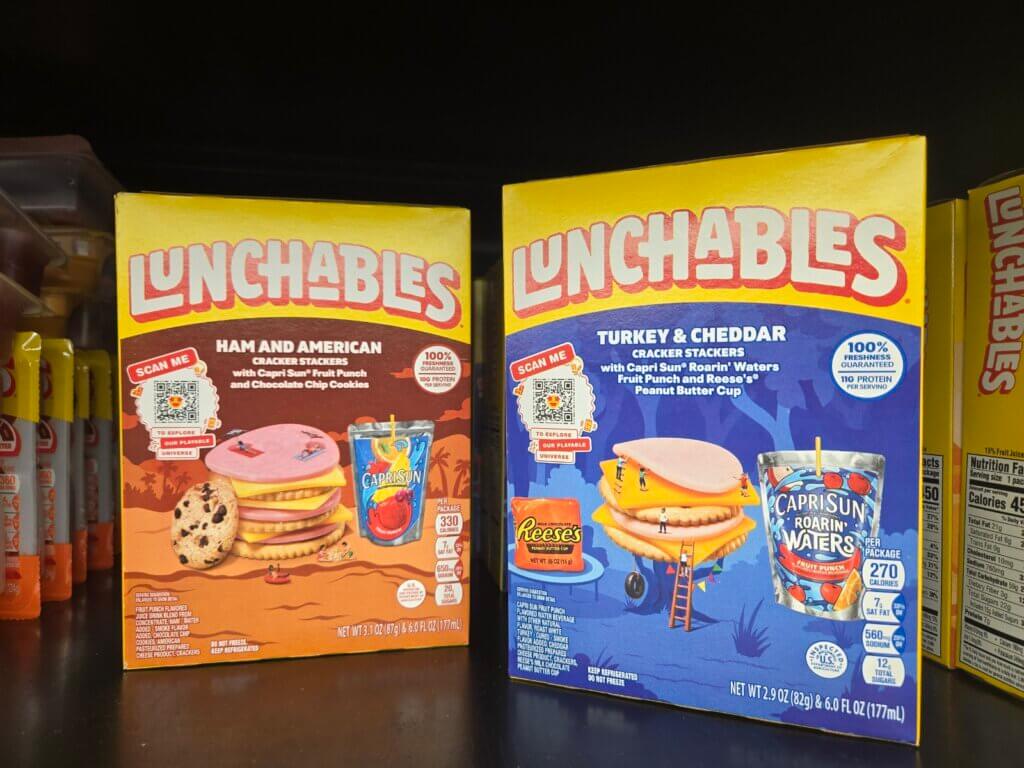The Kraft Heinz Company is a multinational food and beverage conglomerate formed in 2015 by merging two companies, H.J. Heinz Company and Kraft Foods Group.
It is the fifth-largest company globally and one of the largest in North America.
- Product Range: Kraft Heinz produces various packaged foods and beverages, including condiments, sauces, snacks, dairy products, frozen foods, and convenience meals.
- Brands: It owns over 200 brands globally, with some of the most well-known being:
- Heinz (Ketchup, Baked Beans, Soups)
- Kraft (Cheese, Mac & Cheese, Dressing)
- Oscar Mayer (Processed Meats)
- Philadelphia (Cream Cheese)
- Velveeta (Cheese Products)
- Planters (Nuts)
- Capri Sun (Juice Drinks)
- Kool-Aid (Drink Mixes)
While an exact count of all products is challenging due to the global scale and variety, Kraft Heinz produces over 5,000 individual products distributed across more than 190 countries.
Most of their products are highly processed and nutritionally poor.
Let’s look at a few Kraft Heinz products that are often considered the most processed and unhealthy.
Kraft Macaroni & Cheese

Kraft Macaroni & Cheese is a beloved comfort food, but it is unhealthy to eat on a regular basis.
High Levels of Sodium
- A single serving (typically about 1 cup prepared) contains around 600–900 mg of sodium, a significant portion of the recommended daily limit (2,300 mg for most adults).
Low In Fiber & Protein
- Kraft Mac & Cheese is made primarily from refined wheat pasta and a powdered cheese mix, offering little fiber, vitamins, or minerals.
- It is also low in protein, only 10g per serving; the recommended amount is 50g (Daily Value and Percent Daily Value: Changes on the New Nutrition and Supplement Facts Labels Daily Value vs. % Daily Value, n.d.).
High in Saturated Fat
- When prepared with the recommended butter and milk, a single serving can be high in saturated fat (4.5g, 22% DV).
High In Calories
- Depending on how it is prepared, Kraft Mac & Cheese is calorie-dense, with about 250–400 calories per serving. This makes it easy to overconsume, especially since many people eat more than one serving in a sitting.
Lunchables

Lunchables, a popular pre-packaged meal option marketed to kids, are often criticized for being highly processed and nutritionally imbalanced.
This blog post provides a detailed analysis of why Lunchables are unhealthy and highly processed: https://grosseating.com/so-happy-to-see-lunchables-off-the-school-menus/
Velveeta Cheese

Nothing else comes to mind except Velveeta for a processed cheese product.
Velveeta cannot legally be labeled as “cheese” because it doesn’t meet the FDA’s definition of cheese, which requires a minimum amount of real dairy content.
Instead, Velveeta uses emulsifiers and stabilizers to create its creamy, shelf-stable texture.
For more on pasteurized cheese products, please check out this blog post where we discuss it in detail: https://grosseating.com/the-truth-about-american-cheese-are-we-eating-plastic/
Let’s take a look at why Velveeta is considered so unhealthy:
Highly Processed
- Velveeta is not made from pure milk but a combination of milk protein and whey protein concentrates. It also contains emulsifiers and preservatives like Sodium Phosphate, Salt, Lactic Acid, Sodium Alginate, and sorbic Acid.
- The heavy processing and inclusion of additives make it far removed from natural cheese.
High Sodium Content
- A single 4-ounce (1 Cup) serving of Velveeta Shells and Cheese contains a whopping 860 mg of sodium, 38% of the recommended daily limit for most adults (2,300 mg).
Low Nutritional Value
- Velveeta contains minimal beneficial minerals and vitamins like calcium and Vitamin D.
- It also lacks fiber, only 5% DV, and is a poor source of protein (only 13g per serving).
High-Calorie Density
- Velveeta is a high-calorie product with about 370 calories per cup, making it easy to overconsume daily calorie requirements.
Delimex Taquitos Frozen Snacks

Delimex Taquitos are a popular frozen snack but are often considered unhealthy due to their highly processed nature and nutritional profile.
Here’s why:
High in Calories and Fats
- A single serving (4 taquitos) of the Beef and Cheese Flour tacos has 410 calories, and it is easy to eat more than one serving in a sitting.
- They are often high in unhealthy fats, particularly saturated fats. A single serving will be more than 20% DV for total fat content.
High Sodium Content
- Like many frozen processed foods, Delimex taquitos are loaded with sodium for flavor and preservation. A serving can contain 660 mg of sodium (29% DV), contributing significantly to the daily recommended limit of 2,300 mg.
Processed Ingredients
- Beef and Cheese Filling: The meat used in these products is often heavily processed and includes added preservatives and fillers. The Cheese is usually processed Cheese, not natural Cheese.
- Flour Tortilla: The tortillas are made from refined, bleached flour, which lacks fiber and nutrients compared to whole grains. Dough conditioners like sodium metabisulfite, corn starch, MICROCRYSTALLINE CELLULOSE, and sodium hydroxide are also added to get the desired texture and flavor.
- Other Additives like DISODIUM INOSINATE AND GUANYLATE are added to extend shelf life and enhance the flavor.
Low Nutritional Value
- Delimex taquitos are low in dietary fiber, vitamins, and minerals. They are high in calories but lack the nutrients that make a meal satisfying or healthy.
- Despite being marketed as a beef product, they are also relatively low in protein, only 13g per serving (4 taquitos).
Cooking Method Concerns
- These snacks are typically fried before freezing, adding extra fats and calories. If prepared in a deep fryer (as many people do), the fat content increases even more.
Miracle Whip

Miracle Whip is presented as a healthier alternative to traditional mayonnaise.
But here is a quick look at why Miracle Whip may not be the most nutritious choice:
High in Added Sugars
- Although Kraft has phased out high fructose corn syrup in many of its products, Miracle Whip still contains it. It also contains added sugar, giving it a slightly sweet flavor.
- A single tablespoon has around 1–2 grams of sugar, which can add up quickly if used in larger quantities.
Bagel Bites

Bagel Bites are a popular frozen snack that combines mini bagels with pizza toppings.
They are made with highly processed components (refined bagels, artificial toppings, and additives), which makes them far removed from fresh, whole foods.
Let’s take a look:
High in Calories and Fat
- A serving of Bagel Bites (usually 4–6 pieces) contains 200–300 calories, which can add up quickly if you eat more than the recommended portion.
- They are high in saturated fat, mainly from cheese and processed meat toppings, which can contribute to elevated cholesterol levels and heart disease if consumed excessively.
High in Sodium
- Bagel Bites contain significant sodium, often around 400–600 mg per serving.
Low Nutritional Value
- Bagel Bites are low in dietary fiber, vitamins, and minerals, offering little nutritional benefit.
Processed Ingredients
- Cheese: Often a processed cheese product rather than natural cheese, made by adding stabilizers and emulsifiers to whey protein.
- Pepperoni or Meat Toppings: These are typically made with processed meats that contain nitrates, preservatives, and artificial flavors.
- Tomato Sauce: Often includes added sugars, artificial flavors, and preservatives.
- Bagels are made from refined white flour, lacking the nutrients and fiber found in whole-grain alternatives. This leads to quick digestion, which can cause blood sugar spikes.
Food Additives
Their ingredient list includes several chemicals that enhance flavor, texture, shelf life, and appearance.
These additives add to the highly processed nature of the product and do not offer any nutritional benefits.
Final Word
All these food products, no doubt, offer convenience, but it’s important to consume such products in moderation, considering their nutritional content and the presence of additives.
Focusing on whole grains, fresh vegetables and fruits, lean proteins (such as chicken, fish, or legumes), and healthy fats (like olive oil, nuts, and seeds) is best.
I am a big believer in cooking at home whenever possible. Preparing meals from scratch allows you to control ingredients and avoid unnecessary oil and sugar.




